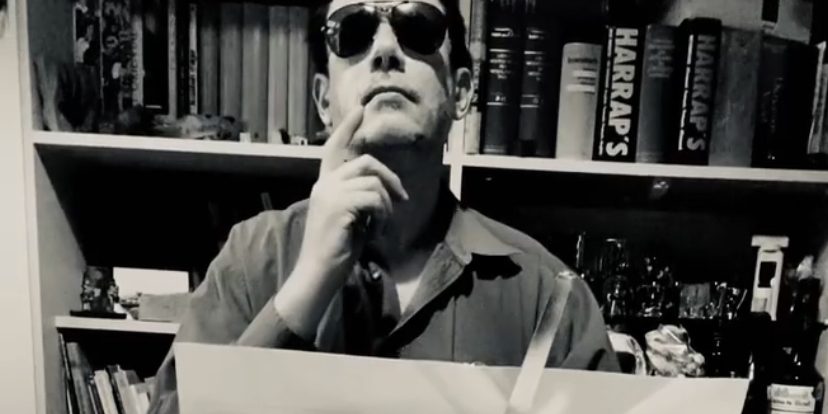By Keith Walsh
When I first encountered Gilles Snowcat sometime around 2015, I found him a kind of musical cartoon character, a playful force of nature who took the guise of a cat in human form while creating badass music. Over the course of his career, he’s released lots of energetic fun sounds, featuring alterations of the various forms of rock, punk, jazz and disco, as well as ambient music.
However, to think of Snowcat as a mere circus act was shortsighted on my part. With the release of his new book, the 3rd edition of The Rock Star Paradox: Are You Such A Boring Musician?, I find a philosophical edge to the man/feline. Gilles The Chesire Snowcat?
This new edition of the book is even more gonzo and humorous than its predecessors, containing tons of wisdom for those looking to pursue the life of a working musician or recording artist. With its mix of inspirational quotes, marketing advice, and self help guidance, The Rock Star Paradox has lots of offer. I had the chance to ask Gilles a few questions and get a closer look at the Rock Star Paradoxes.
POPULAR CULTURE BEAT: Good morning Gilles I totally enjoyed the book. Let’s start with this: What’s the most important paradox, if you had to pick only one?
GILLES SNOWCAT: Probably the number 3: “Sell your soul to business to keep your artistic integrity.” It’s the one that changed the most for me, and often when I meet a musician, I think that he’d desperately need to read it.
POPULAR CULTURE BEAT: What makes that one the most important?
GILLES SNOWCAT: So many musicians see money as an evil thing that will destroy their integrity and inspiration and career and whatever they like. They act like once money enters the equation, they’re doomed. When it’s totally the opposite. Once the money matter has been discussed, art can flourish for the better. Money makes things clear, you don’t have to feel that you owe anything or so, you paid -or got paid- and the rest takes care of itself. I never got any problem with musicians who are clear about the money they want or the amount they’re ok to put into a project. It’s easy, we have a drink, discuss and shake hands to seal the deal. Then after it’s all about music.
Also, I encourage musicians to sell your music. Even more, to start any project with sales in mind. Don’t compromise your art, just have in mind that it’s gonna end up in a shop. You’d be surprised how strongly the quality of your music will improve.
I always had sales in mind but I was also OK to give away my art, thinking that I’d rather have people listen for free than no one at all. Then one day I made the conscious decision to only sell my music and I was the first to be surprised to see myself focus on quality of production, on making sure a take would be good, while before I didn’t care much about that. And my music didn’t become commercial or so, it was still the same, but with a more professional attitude. It doesn’t mean that you shouldn’t sometimes give away some songs, if you feel like. But make the core of your work something to sell.
POPULAR CULTURE BEAT: What do you say about some boring musicians (and I mean their music is boring) getting to be superstars?
GILLES SNOWCAT: I guess some stop being boring once they become successful, because they suddenly have access to pleasures that were unknown to them just previously. That makes them more open -to put it in a politically correct way-, and let’s not forget the new network of interesting people they get to know.
POPULAR CULTURE BEAT: Who’s the most boring superstar of all?
GILLES SNOWCAT: The guy from Coldplay, Chris Martin, oozes boredom. He’s anti-charismatic, which at least perfectly matches the lifeless music of his group, and as if it wasn’t enough, he started to boast about his so-called climate-friendly actions. He has the right to do so, of course, but once he starts boasting about it, he loses all credibility. Martin may be a very nice chap to talk with, but his public persona is terminally boring.
POPULAR CULTURE BEAT: Why would you use a quote from Henry Kissinger? You have friends in Vietnam, and you know his role in the U.S. war there.
GILLES SNOWCAT: That quote is accurate, that’s the only reason why I mentioned it. Anyone involved in war decisions has blood on their hands, anyway. I could also quote Napoleon for his great strategies, yet the guy sent soldiers to the butchery. This doesn’t make his quotes less relevant though.
POPULAR CULTURE BEAT: How did you get so wise, and who’s your favorite philosopher?
GILLES SNOWCAT: I like the writer Robert Greene, he’s not an ancient philosopher, he’s a contemporary writer who has skills in observing people, studying behaviour and social interactions. One can gain lots of wisdom reading Greene’s books on power. I also like manager Simon Napier-Bell’s books, they’re full of great hedonistic wisdom.
POPULAR CULTURE BEAT: What’s new in this new edition?
GILLES SNOWCAT: The second edition was more an upgrade of the first one, but this third edition is almost a new book based on The Rock Star Paradox. One more paradoxe, some important additional stuff, less typos although I just saw a big one in paradox 3.
POPULAR CULTURE BEAT: How do you manage to balance your love life, your music life, and your writer’s life?
GILLES SNOWCAT: By using the paradoxes.
POPULAR CULTURE BEAT: Why 22 paradoxes? Why not 23, or 21?
GILLES SNOWCAT: There were 21 paradoxes in previous editions, now 22. It’s no magical number, just the amount of paradoxes that I could think of when I wrote the book…
POPULAR CULTURE BEAT: Thanks, Gilles!
Gilles-Snowcat dot com
Gilles Snowcat On Bandcamp
Gilles Snowcat On Spotify
A Peek Into Gilles’ ‘We See Limes’ Studio
The Many Whiskers Of The Snowcat
finis

